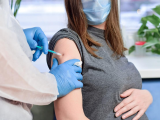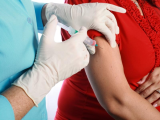May 2, 2012
Sanofi reports good results in phase 3 study of 4-strain flu vaccine in kids
Sanofi Pasteur has announced that its quadrivalent (four-strain) flu vaccine (QIV) compared well with standard trivalent inactivated vaccines (TIVs) for safety and immunogenicity in children 6 months through 8 years old. The QIV contains two influenza B strains, one from each of the two major B lineages, Victoria and Yamagata, which vary unpredictably in prevalence from year to year. Sanofi reported the preliminary results of its randomized, observer-blinded, multicenter study at the Pediatric Academic Societies annual meeting yesterday in Boston. The trial involved more than 4,300 children who were assigned in a ratio of 4:1:1 to receive either the QIV, the 2010-11 seasonal TIV, containing a Victoria lineage B strain, or a TIV containing a Yamagata B strain. All four strains in the QIV met the non-inferiority criteria for antibody responses in comparison with the two TIV vaccines. These findings held true for the overall study group and for the age subgroups 6 through 35 months and 3 through 8 years, the company said. In addition, the QIV met superiority criteria for each B strain when compared with the TIV that did not contain the corresponding B strain. Further, the safety profiles of the QIV and TIVs "did not materially differ," the company said.
May 1 Sanofi press release
Study: H1N1 vaccine did not increase risk of fetal death
Vaccination against pandemic 2009 H1N1 flu (pH1N1) did not raise the risk of miscarriage or stillbirth, a Danish study of 54,585 pregnant women revealed. Writing in BMJ today, researchers said they analyzed data for 54,585 women who gave birth from November 2009 to September 2010, of whom 7,062 (12.9%) received the pH1N1 vaccine. All told, 1,818 pregnancies ended with fetal deaths—1,678 miscarriages and 140 stillbirths. The investigators found that receiving the pH1N1 vaccine did not increase the risk of fetal death (adjusted hazard ratio, 0.79; 95% confidence interval, 0.53-1.16). An accompanying editorial said the study "provides even clearer evidence that the benefits of immunisation against influenza outweigh the risks for pregnant women" but added that the authors' exclusion of women of less than 7 weeks' gestation and inclusion of a small number of women immunized in the first trimester were study weaknesses.
May 2 BMJ abstract
May 2 BMJ editorial
BARDA extends Pfenex anthrax vaccine contract
Pfenex Inc., a biotechnology company based in San Diego, announced yesterday that the Biomedical Advanced Research and Development Authority (BARDA) has exercised an option to extend the company's contract to develop a recombinant protective antigen (rpA)–based anthrax vaccine. The company's platform involves the production of anthrax vaccine rPA from Pseudomonas fluorescens, according to a Pfenex press release. The company said that, during the contract's base period, researchers showed that a strongly immunogenic, stable, and protective form of rPA could be expressed and recovered from highly efficient fermentation of a strain of P fluorescens engineered to produce rPA. Pfenex CEO Bertrand Liang said BARDA's contract extension will allow the company to develop a process capable of meeting Strategic National Stockpile goals for production, shelf life, and administration. BARDA awarded the original contract, worth up to $18.8 million, in July 2010. It was one of eight contracts awarded in a BARDA push to modernize and speed the development of countermeasures against natural and manmade threats.
May 1 Pfenex press release
FAO confirms spread of novel FMD strain to Gaza Strip
A novel strain of foot-and-mouth disease (FMD) has been detected in cattle in the Gaza Strip, confirming fears of the spread of the new variant, the United Nations Food and Agriculture Organization (FAO) said today. The FMD strain is new to the area, and animals haven't acquired any resistance to it, the agency said. The FAO added that vaccines against the novel SAT2 virus are in short supply. In February the SAT2 variant was found in Egypt and Libya, and it was confirmed in the neighboring Gaza Strip area on Apr 19. Juan Lubroth, DVM, PhD, the FAO's chief veterinary officer, said in a statement that the disease threatens Gulf countries, and perhaps southern and eastern Europe and beyond. He said limiting animal movement is the top priority for preventing the spread of the virus, along with heightened surveillance and quick outbreak detection and response. The FAO said the virus has also been detected in Bahrain, but only at a quarantine center. Israel has targeted herds along its southern border for vaccination to create a protective buffer zone, and the Gaza Strip will receive 20,000 doses to protect its cattle, with 40,000 doses as soon as possible targeting sheep and goats. The FAO and its partners are negotiating with producers and vaccine banks to find more vaccine sources.
May 2 FAO press release


















